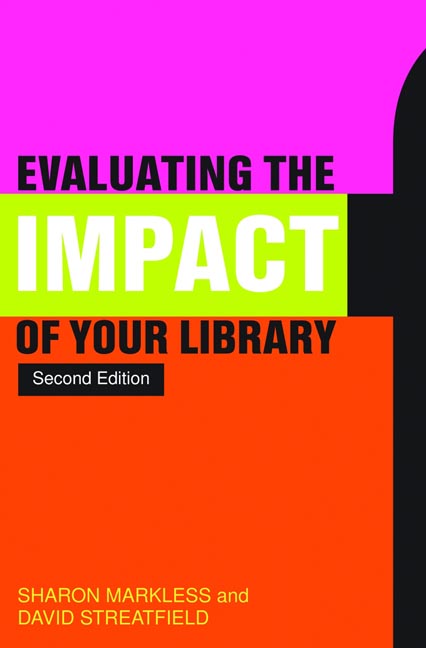Book contents
- Frontmatter
- Dedication
- Contents
- Introduction
- About the authors
- Impact and all that: use of some key terms in this book
- Part 1 The Context
- Part 2 Evaluating Impact
- 4 Putting the impact into planning
- 5 Getting things clear: objectives
- 6 Success criteria and impact indicators: how you know you are making a difference
- 7 Making things happen: activities and process indicators
- 8 Thinking about evidence
- 9 Gathering and interpreting evidence
- 10 Taking stock, setting targets and development planning
- Part 3 The Bigger Picture
- References
- Notes
- Index
- Evaluating and Measuring the Value, Use and Impact of Digital Collections
- Measuring Library Performance
- Miscellaneous Endmatter
7 - Making things happen: activities and process indicators
from Part 2 - Evaluating Impact
Published online by Cambridge University Press: 08 June 2018
- Frontmatter
- Dedication
- Contents
- Introduction
- About the authors
- Impact and all that: use of some key terms in this book
- Part 1 The Context
- Part 2 Evaluating Impact
- 4 Putting the impact into planning
- 5 Getting things clear: objectives
- 6 Success criteria and impact indicators: how you know you are making a difference
- 7 Making things happen: activities and process indicators
- 8 Thinking about evidence
- 9 Gathering and interpreting evidence
- 10 Taking stock, setting targets and development planning
- Part 3 The Bigger Picture
- References
- Notes
- Index
- Evaluating and Measuring the Value, Use and Impact of Digital Collections
- Measuring Library Performance
- Miscellaneous Endmatter
Summary
Here we look at translating objectives into action. It is the most straightforward and least demanding stage of the process for most libraries. We know from our workshops that once people have a clear idea of what they are trying to achieve it is usually fairly easy to think of a variety of ways to get there. Then, when you have decided on what to do, finding ways of telling whether you have done them (process indicators) is not usually very challenging.
Why activities? Why now?
We have taken up a lot of space in the last few chapters warning you of the dangers of getting sidetracked when you are trying to evaluate your impact by looking at what you do (activities and processes), rather than concentrating on what difference you make. Why are we moving the goalposts now? Activities do matter: you need to think about them and keep them under review. That is why we have written this chapter. However, if you want this stage in the process to support the evaluation of your impact, you need to get the timing and the focus right.
Timing
You should leave any consideration of activities and processes until after you have completed your initial work on objectives and impact indicators. We have seen what happens to impact evaluation when library managers get caught up with questions about service delivery, allocation of resources, allocating staff time and prioritizing among a wide range of activities. Attention slips away from impact with the result that planning once again focuses around provision. For example, the UK public library annual library plans are still replete with specific processes and actions aimed at keeping the services going, enhancing the library infrastructure and activity building. These processes very much reflect the hands-on, operationally focused approach of many library managers. We are not saying that such concerns are not important, just that they need to wait until now, after you clarify what you want to achieve and how you will know you are being successful.
Focus
The danger when considering activities and processes is that you might record everything that you are doing in the general area covered by your objectives. We recommend that you tie activities into the objectives, specifically linking a set of actions to each impact objective.
- Type
- Chapter
- Information
- Evaluating the Impact of Your Library , pp. 105 - 112Publisher: FacetPrint publication year: 2012



